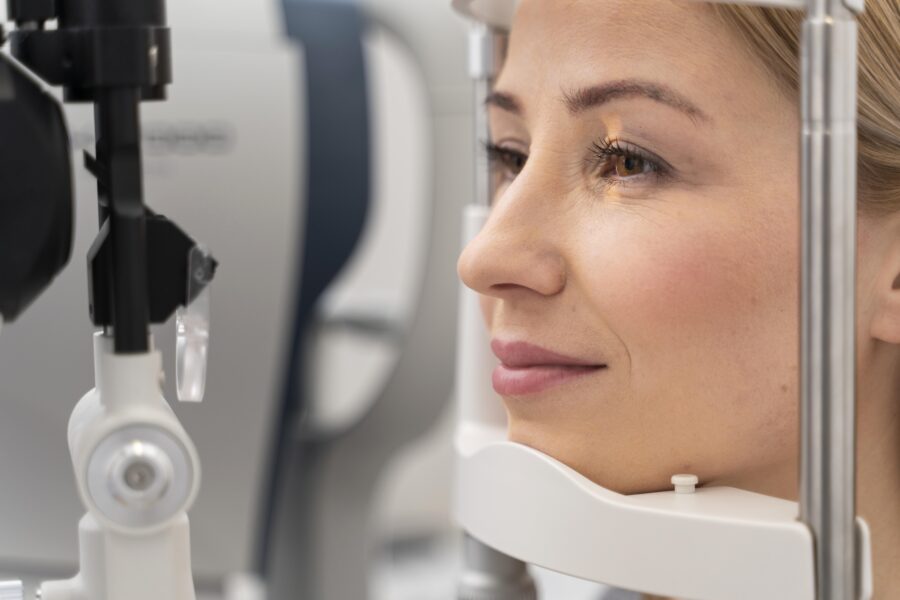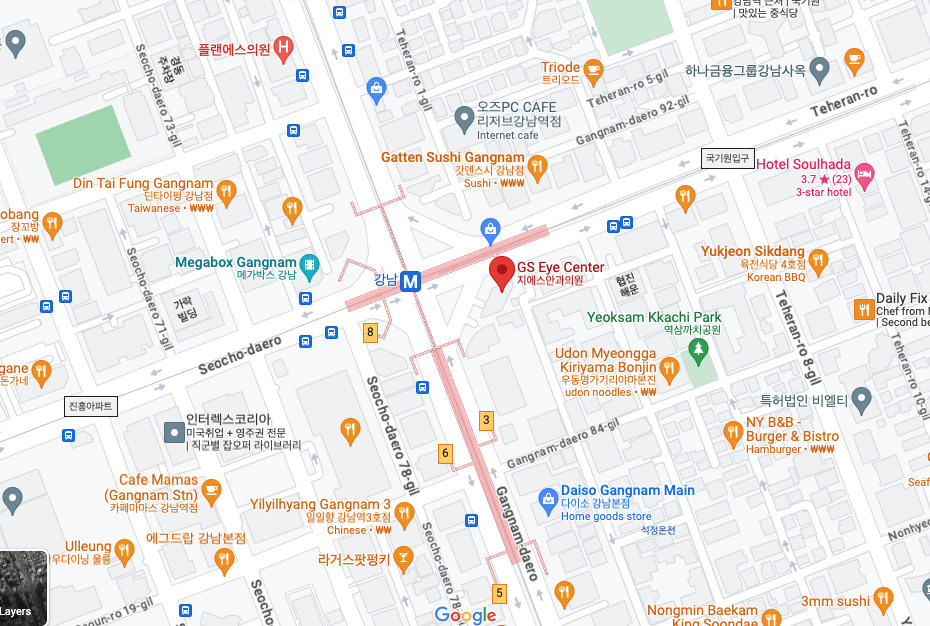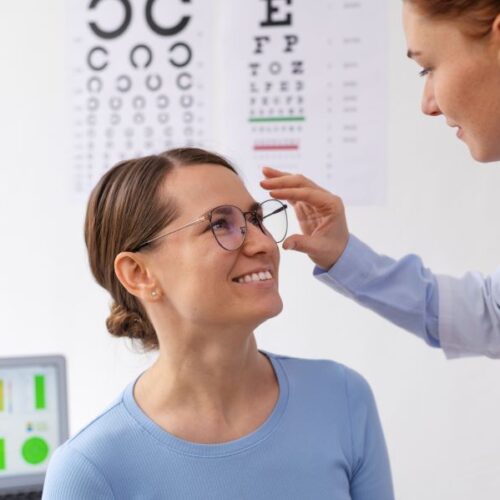If you’ve been neglecting your eyes lately and thinking, “I can’t see as well as I used to, and I’m tired, is it because I’m blurry?” Cataracts are a typical aging disease. However, the number of cataracts in people in their 40s and 50s is increasing rapidly due to increased eye strain caused by frequent use of IT devices such as smartphones.
Fine-tuning vision after cataract surgery is what many people expect from cataract surgery, and most people experience improved vision and progress in their daily lives. However, not everyone is guaranteed a perfect vision recovery outcome, and there is a chance that some symptoms of dislocated lens after cataract surgery may occur.
So, we’re going to talk about what foods can help you recover your vision, what foods not to eat after cataract surgery, and training eyes after cataract surgery. Also, one of the most important points for women is how long after cataract surgery can i wear eye makeup. We understand the desire to wear fancy makeup, but our eye health should come first, right? Now that we’ve covered the basics, let’s conquer cataract surgery with this article!
1.What is cataract surgery?
Cataract surgery is an operation performed to treat an eye condition that causes objects to appear cloudy, as if foggy. The lens in your eye plays an important role in focusing your vision so that you can see things. A cataract is a clouding of the eye’s lens that reduces vision, usually due to aging, inflammation, or congenital causes.
Cataract surgery aims to remove the cloudy lens and replace it with an artificial lens (intraocular lens), which is selected and inserted into the eye based on the patient’s eye condition. This allows for fine-tuning vision after cataract surgery and improving the quality of daily life. You should also continue to train your eyes after cataract surgery for faster vision recovery after surgery.
Am I a candidate for cataract surgery? – Precursors
The symptoms of cataracts are the same whether they are congenital or acquired. The lens becomes cloudy and vision is reduced and blurred. In some cases, the lens may harden and suddenly become myopic, making it difficult to see near objects.
- objects appear to be two or more colors overlapping
- difficulty focusing
- you notice glare or light spots
- difficulty driving at night
If you experience any of these symptoms, it’s time for a cataract eye exam.
2. how long after cataract surgery can i wear eye makeup?
how long after cataract surgery can i wear eye makeup? After cataract surgery, your eyes will be sensitive, so we recommend avoiding makeup for a period of time. No matter how much you train your eyes to be healthy after cataract surgery, some makeup products can irritate your eyes or cause infections, which can delay fine-tuning your vision after cataract surgery. Therefore, you should be cautious about wearing makeup around your eyes. In most cases, you should be careful for about a week, but it’s safest to avoid makeup altogether for a few weeks after surgery.
HOW LONG AFTER CATARACT SURGERY CAN I WEAR EYE MAKEUP? Now that you know, your doctor’s instructions regarding makeup and key points will vary depending on your condition, but you should avoid makeup around your eyes until your doctor deems it safe and tells you to. Before you start wearing makeup, be sure to wash your hands and face thoroughly, avoid using old or expired cosmetics, and clean or replace your makeup tools regularly to minimize the risk of infection.
3. food not to eat after cataract surgery
After cataract surgery, it’s important to eat foods that are good for your eyes to help them recover quickly, but unfortunately, many of our favorite foods are listed as FOODS NOT TO EAT AFTER CATARACT SURGERY. We know this is sad news for everyone, but we’ll have to put up with it for the sake of fine-tuning vision after cataract surgery. Let’s take a look at the foods not to eat after cataract surgery.
- Refined carbohydrates: Refined carbohydrates such as white rice, white bread flour, etc. are slow to digest and spike blood sugar, so it’s best to avoid them after surgery to help your digestive system recover. Because they are low in fiber and essential nutrients, they can slow down the healing process after cataract surgery.
- Fried foods: Fried foods such as fries, chicken, and French fries increase blood lipid levels due to excessive oil absorption. Because fried foods are high in fat and high in calories, they can put a strain on your digestion. Since your digestive system may be weakened after surgery, eating high-fat foods can cause digestive upset or indigestion, which can negatively affect your eye health.
- Alcohol: You should reduce your alcohol intake while recovering from eye surgery. Alcohol can upset your body’s water balance. Drinking fluids and staying hydrated is important after surgery, and alcohol can accelerate the loss of water from your body. Therefore, your eyes are more likely to become dry. -Avoid alcohol.
The above foods are foods not to eat after cataract surgery, so in order to fine-tune your vision after cataract surgery, it is important to eat lots of green vegetables, which are rich in vitamins and minerals, as well as zinc and omega 3. It is also recommended to drink lots of water to prevent dehydration of the eyes.
4. Foods to Help with Cataracts
출처: Freepik
Foods that normally slow down the aging process in the body are often very helpful in slowing down cataracts. These include green tea and red wine, as the catechins in green tea and the tannins and anthocyanins in red wine trigger antioxidant responses in the body to protect the body, and red wine in particular is known to be high in polyphenols.
However, red wine also contains alcohol, so if your liver is not good at breaking down alcohol, you need to be careful because it can actually accelerate aging. Therefore, rather than recommending wine per se, I often recommend that you eat more blueberries, apples, broccoli, cabbage, etc. in your daily diet.
Also, one thing you should definitely avoid is smoking, which can cause cataracts to come on two to three times as fast. Smoke from cooking can also age you, so if you’re a frequent cook, we recommend using induction rather than gas stoves.
5. training eyes after cataract surgery
One of the side effects of cataract surgery is the symptoms of dislocated lens after cataract surgery. In fact, there are many cases where the lens is dislocated or tilted away from the center of the lens immediately after surgery. In this case, you may experience astigmatism that you didn’t have before, or it may worsen. To prevent this, here are some tips for training eyes after cataract surgery.
- Eye rolling: Gaze into the distance and slowly turn your eyes clockwise, then counterclockwise, and so on. This exercise stimulates the muscles in your eyes, which can improve your eye movement and coordination.
- Distant gazing: Excessive use of vision at close range can strain your eyes. Periodically gazing into the distance can give your eyes a break and improve your eye coordination and muscle strength.
- Blinking: Closing and opening your eyes tightly can help rest and hydrate your eyes. It’s best to let your eyelids fully cover your eyes before opening them, rather than blinking rapidly. This is especially good to do after prolonged monitor viewing.
As you can see, we’ve covered what you need to know about fine-tuning your vision after cataract surgery. As mentioned earlier, we’ve also covered what not to eat after cataract surgery, training eyes after cataract surgery, how long after cataract surgery can i wear eye makeup, and other post-operative precautions and care.
If you are worried about the symptoms of dislocated lens after cataract surgery, why not consult with GS Ophthalmology, which has 18 years of experience in safe surgery?
GS Ophthalmology is a team of highly qualified professionals who prioritize the health of each individual’s eyes. For safe and accurate diagnosis and treatment, we operate a 1:1 customized surgery system by determining the type of lens and surgical method that suits your eye condition.
We also perform most of our surgeries using the Femto Laser, which minimizes the symptoms of dislocated lens after cataract surgery and has better safety and outcomes than traditional medical knife or surgeon techniques.
We also have a 15-bed inpatient hospitalization unit for quick recovery after surgery, where patients can spend as much time as they need in privacy and quiet. To ensure a comfortable environment for patients, GS Ophthalmology uses the 8th floor as a cataract clinic center.
In fact, there are many patients who have experienced fine-tuning vision after cataract surgery at GS Ophthalmology, and they have written in detail about their cataract surgery experience and postoperative progress.
If you want to experience fine-tuning vision after cataract surgery, check out GS Ophthalmology YouTube and website! GS Ophthalmology answers questions such as ‘how long after cataract surgery can i wear eye makeup’, ‘food not to eat after cataract surgery’, ‘training eyes after cataract surgery’, ‘symptoms of dislocated lens after cataract surgery’, and also explains training eyes after cataract surgery in detail for each patient.
?Tips to Know After Cataract Surgery!
What is Cataracts and how to treat Cataracts?
The Cataracts occurs when the natural lens at the back of the iris and pupil becomes cloudy. The most effective way to treat cataracts is to under go cataract surgery to restore vision by removing and replacing the cataract-affected lens with an artificial one.
How much does eye surgery in Korea cost?
According to the Medical Tourism site's chart, Korea ranked second as the best destination for laser eye surgery because of its advanced technology and affordable price. The total cost for both eye surgeries in Korea is lower than that in other countries. Don't hesitate to contact GS Eye Clinic via our KakaoTalk Channel for more information about the total price of eye surgery in Korea.
Where should I get my eye surgery in Korea?
GS Eye Clinic in Seoul, Korea, is at the forefront of the latest technological advancements in laser eye surgery, including cataract surgery, Smile Lasik, and Lasek. Please schedule a consultation with GS Eye Clinic today to explore your options via our KakaoTalk Channel or visit us at 8,15,16F, Mizin Plaza, 390 Gangnam-daero, Gangnam-gu, Seoul, Korea.
GS Ophthalmology Center
Directions 8,15,16F, Mizin Plaza, 390 Gangnam-daero, Gangnam-gu, Seoul, Korea












